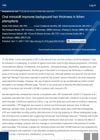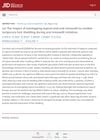Search
for
Sort by
Research
810-840 / 1000+ results
research Pericardial, Pleural Effusion and Anasarca: A Rare Complication of Low-Dose Oral Minoxidil for Hair Loss
A woman developed swelling in her body after taking low-dose oral minoxidil for hair loss, but it resolved after stopping the medication.

research Pericarditis and Peripheral Edema in a Healthy Man on Low-Dose Oral Minoxidil Therapy
A man got heart and swelling issues from a hair loss medication, so doctors advise careful use, especially in people with past health problems.
research Faculty Opinions Recommendation of There Is a Positive Dose-Dependent Association between Low-Dose Oral Minoxidil and Its Efficacy for Androgenetic Alopecia: Findings from a Systematic Review with Meta-Regression Analyses
research Effects of a Low-Dose Desogestrel-Ethinylestradiol Combination on Hirsutism, Androgens, and Sex Hormone Binding Globulin in Women with Polycystic Ovary Syndrome
Low-dose oral contraceptives reduced hair growth and testosterone levels in women with polycystic ovary syndrome.

research Faculty Opinions Recommendation of Review of Oral Minoxidil as Treatment of Hair Disorders: In Search of the Perfect Dose
Low-dose oral minoxidil is a promising, safe treatment for various hair diseases, improving hair thickness and density, but more research is needed on long-term side effects and treatment duration.
research Low-Dose Oral Minoxidil in Frontal Fibrosing Alopecia: Series of 122 Patients
Low-dose oral minoxidil can improve hair and eyebrow growth in frontal fibrosing alopecia.

research Oral Minoxidil New York Times Coverage: The Impact on Patient Perceptions and Dermatologists’ Approaches to Androgenetic Alopecia
The New York Times article boosted interest in using low dose oral minoxidil for hair loss.

research Evaluation of the Safety and Effectiveness of Oral Minoxidil in Children: A Systematic Review
Low-dose oral minoxidil is safe for treating children's hair disorders.
research How Media Coverage of Oral Minoxidil for Hair Loss Has Impacted Prescribing Habits
Media coverage led to more dermatologists prescribing low-dose oral minoxidil for hair loss.

research Role Of Oral Minoxidil In The Treatment Of Androgenetic Alopecia
Low-dose oral minoxidil can help treat male and female pattern hair loss, especially in those who can't use topical treatments or have heart health issues.

research Efficacy and Safety of Low-Dose Oral Minoxidil in Men with Androgenic Alopecia
Low-dose oral minoxidil effectively treats male pattern baldness.

research Androgenic Effects of Oral Contraceptives: Implications for Patient Compliance
Newer low-dose oral contraceptives with less androgenic effects improve patient compliance.

research Low-Dose Daily Aspirin Reduces Topical Minoxidil Efficacy in Androgenetic Alopecia Patients
Daily low-dose aspirin lowers minoxidil's effectiveness for hair loss treatment.

research Use of Oral Contraceptives in the Management of Acne
Birth control pills with low-dose estrogen and antiandrogenic progestins can effectively treat acne.

research Low-Dose Metformin and Profibrotic Signature in Central Centrifugal Cicatricial Alopecia
Low-dose metformin may help hair regrowth and reduce inflammation in CCCA.

research Prospective Cardiovascular Evaluation with 24-Hour Holter and Ambulatory Blood Pressure Monitoring in Men Using 5-mg Oral Minoxidil for Androgenetic Alopecia
The conclusion is that 24 weeks of low-dose oral minoxidil is safe for men with hair loss, with no significant changes in heart rate or blood pressure.

research Morning Periorbital Edema Due to Low Dose Oral Minoxidil
Low doses of oral minoxidil, a hair loss treatment, can cause temporary morning swelling around the eyes, but it's not serious and can disappear with continued use or dose adjustment.

research Changes in Minoxidil Prescribing After Media Attention About Oral Use for Hair Loss
After a New York Times article talked about using low-dose oral minoxidil for hair loss, more people started getting this drug prescribed, but this trend didn't last long.

research Women's Health Care During the Perimenopause
The document concludes that low-dose oral contraceptives and hormonal therapies can manage perimenopause symptoms and reduce some health risks, but lifestyle changes and disease screening are also important.
research Female Pattern Hair Loss
Low-dose oral minoxidil effectively reduces hair loss in women with female pattern hair loss.

research The Inflammatory Component of Androgenetic Alopecia
Androgenetic alopecia, a genetic disorder affecting up to 50% of adults, is caused by an excessive response to androgens leading to hair follicle shrinkage. Treatments include FDA-approved drugs, other therapies like low-dose oral minoxidil, and hair transplantation.

research What's Old Is New Again
Low-dose oral minoxidil is being revisited as a promising hair loss treatment.

research This Month in JAAD Case Reports: August 2022
Low-dose oral minoxidil often improves hair loss, and early treatment of traction alopecia is effective but harder if delayed.
research Monilethrix Is a Hereditary Hair Shaft Disorder
Monilethrix is a rare genetic hair disorder with no cure, but low-dose oral minoxidil may help.
research Systemic Minoxidil for Hair Disorders in Pediatric Patients: A Safety and Tolerability Review
Low-dose oral and sublingual minoxidil seem safe for children with hair disorders.

research Recommendations on the Clinical Management of Androgenetic Alopecia: A Consensus Document from the Spanish Group of Trichology of the Spanish Academy of Dermatology and Venereology
Dermatologists recommend oral dutasteride for male hair loss, low-dose oral minoxidil for female hair loss, and a multidisciplinary approach for young patients, with caution during pregnancy.

research Hair Follicle Sulfotransferase Activity and Effectiveness of Oral Minoxidil in Androgenetic Alopecia
Low SULT activity in hair follicles leads to better response to oral minoxidil for hair loss.

research Oral Minoxidil Improves Background Hair Thickness in Lichen Planopilaris
Oral minoxidil can increase or maintain hair thickness in most people with lichen planopilaris, with mild side effects.

research The Impact of Overlapping Topical and Oral Minoxidil to Combat Temporary Hair Shedding During Oral Minoxidil Initiation
Using both topical and oral minoxidil does not reduce hair shedding.